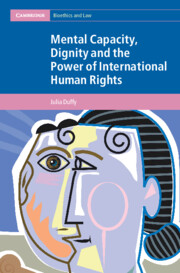Book contents
- Mental Capacity, Dignity and the Power of International Human Rights
- Cambridge Bioethics and Law
- Mental Capacity, Dignity and the Power of International Human Rights
- Copyright page
- Dedication
- Contents
- Acknowledgements
- Table of Cases
- Table of Treaties
- Abbreviations
- 1 Introduction and Background
- 2 Article 12 – Context and Background
- 3 The Principle of Indivisibility and Article 12
- 4 Article 12 and Autonomy
- 5 Article 12 and Dignity
- 6 Article 12 and Equality
- 7 Conclusion
- References
- Index
- Cambridge Bioethics and Law
7 - Conclusion
Published online by Cambridge University Press: 03 August 2023
- Mental Capacity, Dignity and the Power of International Human Rights
- Cambridge Bioethics and Law
- Mental Capacity, Dignity and the Power of International Human Rights
- Copyright page
- Dedication
- Contents
- Acknowledgements
- Table of Cases
- Table of Treaties
- Abbreviations
- 1 Introduction and Background
- 2 Article 12 – Context and Background
- 3 The Principle of Indivisibility and Article 12
- 4 Article 12 and Autonomy
- 5 Article 12 and Dignity
- 6 Article 12 and Equality
- 7 Conclusion
- References
- Index
- Cambridge Bioethics and Law
Summary
Chapter 7 summarises the book’s findings and explains their implications for advocacy and law reform. It argues that recognition of the indivisibility of human rights is important to ensure that targeted services are provided for people with disability to address their disproportionate levels of socio-economic disadvantage. It decries the privileging of civil and political rights especially the right to legal capacity over all other rights, for encouraging the ‘lazy state’ that erroneously justifies its neglect of marginalised people in the name of upholding their human rights. It provides the example of personalised or individualised services premised on simplistic notions of choice and control, which often fail to uphold the rights of people with cognitive disabilities. It stresses the importance for the state and community of acknowledging difference to promote services that ensure civil, economic, political, social and cultural inclusion in all cases.
Keywords
- Type
- Chapter
- Information
- Publisher: Cambridge University PressPrint publication year: 2023

